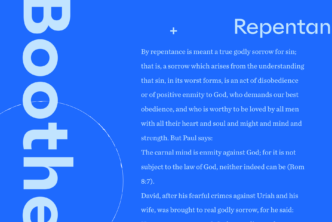Karl Barth (May 10, 1886–1968) and Cornelius Van Til (May 3, 1895–1987) tend to be polarizing figures in church theology. Van Til was a firm opponent of Barth’s theology, arguing that it was fundamentally flawed and anti-biblical. Despite their sharp differences, Barth and Van Til were similar in that they were both strongly influenced by the work of John Calvin.
In Church Dogmatics, The Epistle to the Romans, Barth states, “Calvin’s theology interests us in its historical context as an outstanding record of Reformation theology that historically—and at times even legally—has served as a basis of proclamation in modern Protestant churches.”
In The Case for Calvinism, Van Til responds to The Case for a New Reformation, The Case for Theology in Liberal Perspective, and The Case for Orthodox Theology. He challenges their views “by setting the truly Christ-centered position of the historic Protestant faith, especially the historic Reformed Faith as found in Calvin and his followers.”
To celebrate the birthdays of Van Til and Barth, Logos Bible Software is offering:
$50 off The Works of Cornelius Van Til—use coupon code VANTIL13 until May 11.
$50 off Barth’s Church Dogmatics—coupon code BARTH13, until May 11.
Eric Sigward, guest blogger and former student of Van Til, wrote the following about Barth and Van Til.
Van Til and Barth on the Celebration of Barth’s birthday, 2013
By Eric H. Sigward
When I entered Westminster Seminary as a freshman in 1975, I was fortunate enough to take Van Til’s last official class as an emeritus professor, “Karl Barth and the Word of God.” My first sessions with the great professor were “buzzing and blooming confusions,” as Van Til used to say. The terms were so large and the relationships so confusing that I despaired of ever understanding what he was saying. Eventually, I got an A– in the class and became a good friend of Van Til’s. It is with the memory of this initial confusion in mind that I approach writing about Van Til and Barth. I wish to show sympathy for those who are not familiar with these men or their theologies. As Van Til once said, “American evangelicals know absolutely nothing about Karl Barth.” I am trying to avoid shutting down the lines of communication between my subjects and you.
Van Til felt that Barth showed a verbal similarity to orthodox Protestantism and yet a thorough-going denial of its contents. Barth was not orthodox, but neo-orthodox. How is it that we Christians can criticize and label the philosophy of another professed Christian as heretical? It is on the basis of Reformed theology’s doctrine of the total depravity of man whereby the natural man denies the authority of God in any area of his life and sets himself up as his own authority (and god). By grace, however, God has penetrated the natural man’s defenses, has given him a new birth and a new trust in the infallibility, inerrancy, and authority of Scripture. With faith in Christ, God gives man faith in his Word. Thus, Christians may criticize error based upon this new epistemological certainty, based upon this new birth in Christ that brings with it all of God’s gracious provisions of salvation, including the mysterious testimony of the Holy Spirit in our hearts. We now naturally recognize one another.
Van Til thought Barth had reworked all the essentials of Reformed Christianity. In a nutshell, Barth had massively changed the traditional doctrine of election into a fabrication that Christ was simultaneously the only eternally elect and the only eternally reprobate man—reprobate upon the cross and elect in the Resurrection. Beware, however, that these “events” did not take place in history at all but in “Geschichte.” This is dialecticisim—espousing one thing and the opposite at the same time. In Barth, it is exhaustively applied to God and all knowledge: We both know and don’t know God at the same time.
Such a myth, fable, or fabrication did not take place in space and time at all but in Geschichte, where eternal history takes place. That is to say, Barth had an uber-system and an uber-realm that would color all other theological statements. Since one wire of orthodox theology can be cut, why not cut them all—the doctrines of Scripture, creation, man, Christ, and salvation? Pursuing the mission of higher criticism and neo-orthodoxy, Barth would translate (Umdeutung) all our words into an ingenious system that resembled Christianity but was not Christian. Fortunately, over the years, Barth has not borne fruit as a church or as a movement. Christians have dropped him or never known him at all, and the only place we find Barthians today is in university seminars made up of graduate students.





